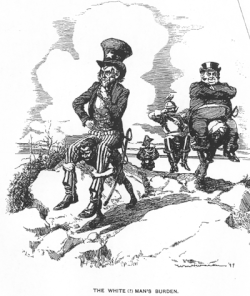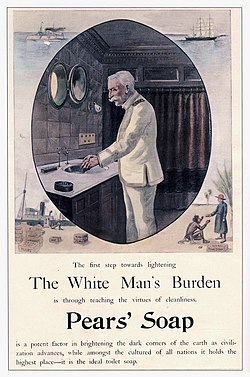The White Man's Burden


"The White Man's Burden" is a poem by the British poet Rudyard Kipling. It was originally published in the popular magazine McClure's, with the subtitle The United States and the Philippine Islands.[1] "The White Man's Burden" may be read as supporting the U.S. colonization of the Philippines and other former Spanish colonies in his poem[2] or, alternatively, as a warning to the United States of the cost of imperial adventure.[3] Although Kipling's poem mixed exhortation to empire with sober warnings of the costs involved, imperialists within the United States latched onto the phrase "white man's burden" as a euphemism for imperialism that seemed to justify the policy as a noble enterprise.[4]
The poem is written in seven verses, following a strict ABCBDEFE rhyming pattern. At face value it appears to be a rhetorical command to white men to colonize and rule people of other nations (both the people and the duty may be seen as representing the "burden" of the title). A century after its publication, the poem still rouses strong emotions, and can be analyzed from a variety of perspectives.
Differing interpretations
The first verse of the Kipling poem reads:
- Take up the White Man's burden —
- Send forth the best ye breed —
- Go, bind your sons to exile
- To serve your captives' need;
- To wait, in heavy harness,
- On fluttered folk and wild —
- Your new-caught sullen peoples,
- Half devil and half child.
A straightforward analysis of the poem may conclude that Kipling presents a Eurocentric view of the world, in which non-European cultures are seen as childlike and demonic. This view proposes that white people consequently have an obligation to rule over, and encourage the cultural development of, people from other ethnic and cultural backgrounds until they can take their place in the world by fully adopting Western ways.
However, some commentators point to Kipling's history of satirical writing, and suggest that "The White Man's Burden" is in fact meant to satirically undermine imperialism. Chris Snodgrass, in A Companion to Victorian Poetry (Blackwell, Oxford, 2002), describes Kipling's poetry as problematizing "imperial sensibilities with wry irony and scepticism, viewing all human endeavour as ultimately transitory". Alzina Stone Dale (in Outline of Sanity, iUniverse, 2005) recognizes that the poem has been used to encourage powerful nations to adopt an imperial role, and writes of "bright young men... using Rudyard Kipling's phrase 'the white man's burden' without catching the irony that Kipling intended."
The term can be interpreted simply as racist, but it can also be taken as a metaphor for a condescending view of non-Western national culture and economic traditions, identified as a sense of European ascendancy which has been called "cultural imperialism". A parallel can also be drawn with the philanthropic view, common in Kipling's formative years, that the rich have a moral duty and obligation to help the poor "better" themselves whether the poor want the help or not.
One criticism of the 2005 Make Poverty History campaign, and specifically the live8 concerts, was that people who argue that it is a responsibility of richer countries to help less-developed countries, have sympathy for the metaphoric idea of a white man's burden.[5] It has been pointed out that the demands by some sections of Western society for foreign military intervention by richer countries in civil wars of less-developed countries, are often expressed in terms analogous to those of the poem: that the intervention is morally correct and would restore the conditions of law and order which are vital to the economic and cultural growth of a nation.[6]
As Max Boot writes: "In the early twentieth century, Americans talked of spreading Anglo-Saxon civilization and taking up the 'white man's burden'; today they talk of spreading democracy and defending human rights. Whatever you call it, this represents an idealistic impulse that has always been a big part in America's impetus for going to war."[7] The title of this book, The Savage Wars of Peace, comes from "The White Man's Burden".
The term "white guilt" is sometimes used as a modern parallel to the historic white man's burden. It is used by some white people to validate discrimination against other white people, because of their own perceived responsibility or culpability for historical wrongs.

Within an historical context, the poem makes clear the prevalent attitudes that allowed colonialism to proceed. Although a belief in the "virtues of empire" was wide-spread at the time, there were also many dissenters; the publication of the poem caused a flurry of arguments from both sides, most notably from Mark Twain and Henry James. Much of Kipling's other writing does suggest that he genuinely believed in the "beneficent role" which the introduction of Western ideas could play in lifting non-Western peoples out of "poverty and ignorance". Lines 3-5, and other parts of the poem suggest that it is not just the native people who are enslaved, but also the "functionaries of empire", who are caught in colonial service. This theme may also be contrasted with the Christian missionary movement, which was also quite active at the time in Africa, India, and other English and European colonies (e.g. the Christian and Missionary Alliance).
Kipling himself was not a worshipper of the power of empire. He wrote many poems celebrating the working classes, particularly the common soldier. Six months after "The White Man's Burden" was published, he wrote "The Old Issue", a stinging criticism of the Second Boer War, and "The Monarchies", an attack on the unlimited and despotic power of kings.
References
- A Companion to Victorian Poetry, Alison Chapman; Blackwell, Oxford, 2002.
- Outline of Sanity Alzina Stone Dale; iUniverse, 2005.
See also
- White Man's Burden, a 1995 film dealing with race.
- White guilt
External links
- Full text of the poem
- "The White Man's Burden" and Its Critics
- The Black Man's Burden by Edward Morel, 1903
- 'The Brown Man's Burden', a response to Kipling's poem by Henry Labouchère
Notes
- ^ "The White Man's Burden." McClure's Magazine 12 (Feb. 1899).
- ^ Pimentel, Benjamin (October 26, 2003). "The Philippines; "Liberator" Was Really a Colonizer; Bush's revisionist history". The San Francisco Chronicle: D3.
- ^ warnings
- Zwick, Jim (December 16, 2005). "Anti-Imperialism in the United States, 1898-1935".
{{cite journal}}: Cite journal requires|journal=(help) - Miller, Stuart Creighton (1982). Benevolent Assimilation: The American Conquest of the Philippines, 1899-1903. Yale University Press. ISBN 0300030819. p. 5, "...imperialist editors came out in favor of retaining the entire archipelago (using) higher-sounding justifications related to the "white man's burden."
- "In Our Pages: 100, 75 and 50 Years Ago; 1899: Kipling's Plea". International Herald Tribune: 6. February 4, 1999. "An extraordinary sensation has been created by Mr. Rudyard Kipling's new poem, The White Man's Burden, just published in a New York magazine. It is regarded as the strongest argument yet published in favor of expansion."
- Judd, Denis (June, 1997). "Diamonds are forever: Kipling's imperialism; poems of Rudyard Kipling". History Today. 47 (6): 37.
{{cite journal}}: Check date values in:|year=(help) Theodore Roosevelt...thought the verses 'rather poor poetry, but good sense from the expansionist stand-point'. Henry Cabot Lodge told Roosevelt in turn: 'I like it. I think it is better poetry than you say'.
- Zwick, Jim (December 16, 2005). "Anti-Imperialism in the United States, 1898-1935".
- ^ Unknown (November 2003). "Kipling, the 'White Man's Burden,' and U.S. Imperialism". The Monthly Review.
- ^ Live8
- Mick Hume Does Africa need these crusaders bearing the White Man's burden? in The Times on June 17, 2005
- The White Man’s Burden: Continent out of focus The Guardian on July 10, 2005 not on The Guardian's own website so needs validation.
- Yasmin Alibhai-Brown Bob Geldof and the white man's burden in The Independent 6 June 2005
- ^ Military intervention
- Mark Steyn Sudan is getting away with murder Daily Telegraph 20 July 2004
- John Laughland Fill Full The Mouth of Famine July 30, 2004 article on the web site of the Embassy of Sudan in Washington D.C.
- ^ Boot, Max (2003). The Savage Wars of Peace: Small Wars and the Rise of American Power. Basic Books. ISBN 046500721X. p. 340
